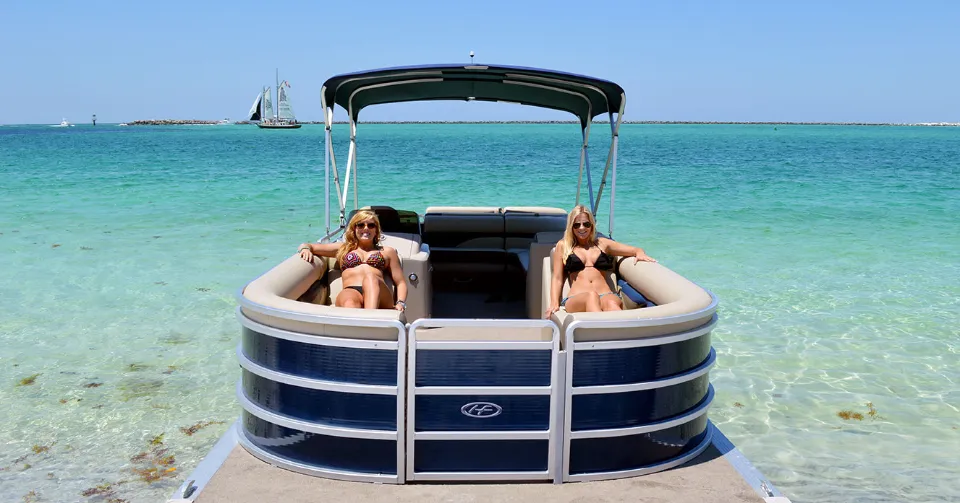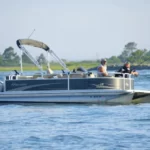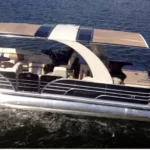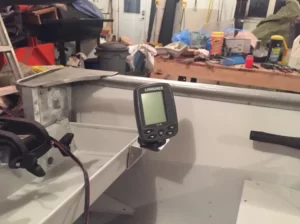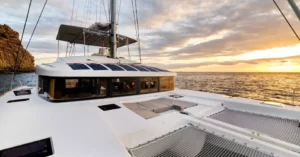This article is ideal for anyone curious about whether they can use pontoon boats to go on ocean-based aquatic adventures.
Can you take a pontoon boat in the ocean? The answer to this question is yes. With some restrictions, pontoon boats can be used in the ocean. Owners of pontoon boats need to steer clear of rough seas and inclement weather, as well as think about anode installation, metal protectants, galvanized trailers, and additional fresh water cleanup procedures.
How can you tell if your pontoon boat can handle being in the ocean or on deeper inland waters? Here are some things to think about.
Can Pontoon Boats Go in the Ocean?
Although pontoon boats were originally designed for inland lakes and rivers, that does not mean that they cannot be used in the ocean. In fact, they can be seen in ocean waters, particularly in bays and Intracoastal waters that are close to the shore.
Pontoons are stable boats if you know how to handle them in choppy waters. They still have the potential to capsize, though, just like any other seagoing vessel, when they are handled improperly.
Things to Consider If You Take a Pontoon Boat in the Ocean
There are 3 things you have to consider when thinking about taking a pontoon boat out in the ocean:
- Safety: There have been horrifying reports of pontoon boats flipping (yes, flipping!) in the ocean. Keep an eye on the shore and be aware of your pontoon boat’s capabilities so you can get back to shore if the weather turns squally. Avoid storms, large swells, and strong winds.
- Stability and Performance: It’s likely that your pontoon boat won’t have enough power to handle unforeseen ocean waves if it can’t even travel over 20 mph. Lifting strakes and a third pontoon can improve performance, but even a third pontoon and a powerful engine (at least 115 horsepower, preferably more) can help.
- Preparation and Maintenance: It turns out that your pontoon boat is likely not prepped for ocean use when you buy it from your dealer.
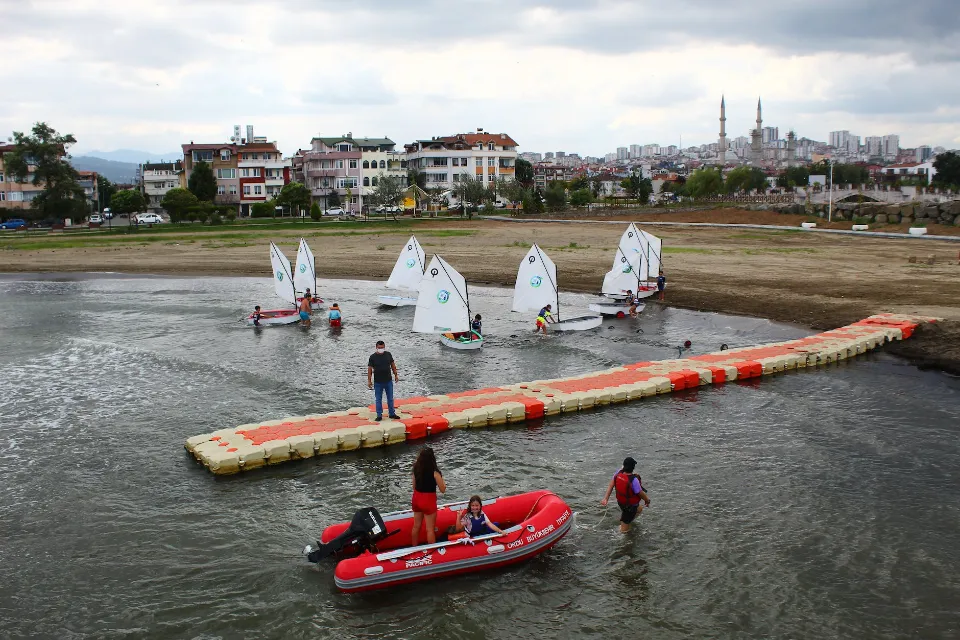
What is the Most Suitable Pontoon Boating Environment?
You must be cautious about how and where to take a pontoon out to sea. As the ideal location for a pontoon in the ocean, I would reserve a protected saltwater bay or cove. Keep it close to shore just for safety’s sake if you intend to sail out to sea in the open sea, you must be fully aware of the weather.
Even the most stable pontoon boats will become much more difficult to handle if the waves start to pick up. Coves, bays, inlets, and other such passages offer more safety and coverage.
What do You need to Keep in Mind With a Pontoon Boat on the Ocean?
Here are a few things to remember if you’re planning to take a pontoon boat out to sea to make sure everything goes as planned.
Preparation and Design
If you’re an experienced boater, you already know that one of the major issues with using a pontoon on the ocean has nothing to do with how it handles choppy waters; rather, it has to do with how it handles the sea in general. Pontoons are not intended to be used in salt water because they are not intended to be seagoing vessels. That is a significant issue if you want to maintain the condition of your pontoon for many years.
By taking your boat out to sea, you run the risk of significant damage if nothing on your pontoon is made to withstand saltwater. Destructive galvanic corrosion is the last thing you need to experience in a pontoon boat, but it will occur.
Anodes
Saltwater and non-reactive metals don’t react very much. But when you combine non-reactive metals with saltwater and electricity, you can experience intense metal corrosion.

Because you depend on the integrity of your pontoons, corrosion is the demise of a pontoon boat. Making sure that your pontoon and hull remain safe becomes absolutely crucial.
Anodes are sacrificial metal parts that attach to the hull or to the motor. They are more reactive than the metal of your boat and will corrode before the rest of your boat. For saltwater, you should use zinc anodes. In brackish water, you can use aluminum anodes, while magnesium anodes are generally used for freshwater.
Other Corrosion
Perhaps the safest metal on the boat in saltwater is the aluminum of your pontoons. Aluminum is slow to corrode. Aluminum will actually be used to make anodes for brackish water. However, there is still danger to the rest of your boat. Almost everything made of metal on a pontoon boat—copper wires, steel fittings, and pretty much anything else—was probably not made with saltwater in mind.
Galvanization may be more or less of an issue, depending on how your pontoon boat was built. Some models do a good job of isolating metals so you need not worry about the two coming into contact, thus reducing those issues. But by no means is that true of all models.
Apart from equipping your entire pontoon boat with less corrosive metals and equipping it to minimize the effects of galvanization and corrosion, the safest thing you can do is to make an effort with salt water maintenance.
Salt Water Maintenance
By getting rid of saltwater as soon as you can, you can stop saltwater from causing your pontoon boat too much damage. Once you get out of the ocean, you should wash it with fresh water. Use a high pressure hose, but not a power washer, to rinse off all the salt water and salt deposits. Every surface, including the chairs, must be taken. Wipe it all down.
The motor is going to need to be flushed as well. You need to make sure this is very thorough to get all the saltwater out. After spending time at sea, you don’t want saltwater to collect in your motor.
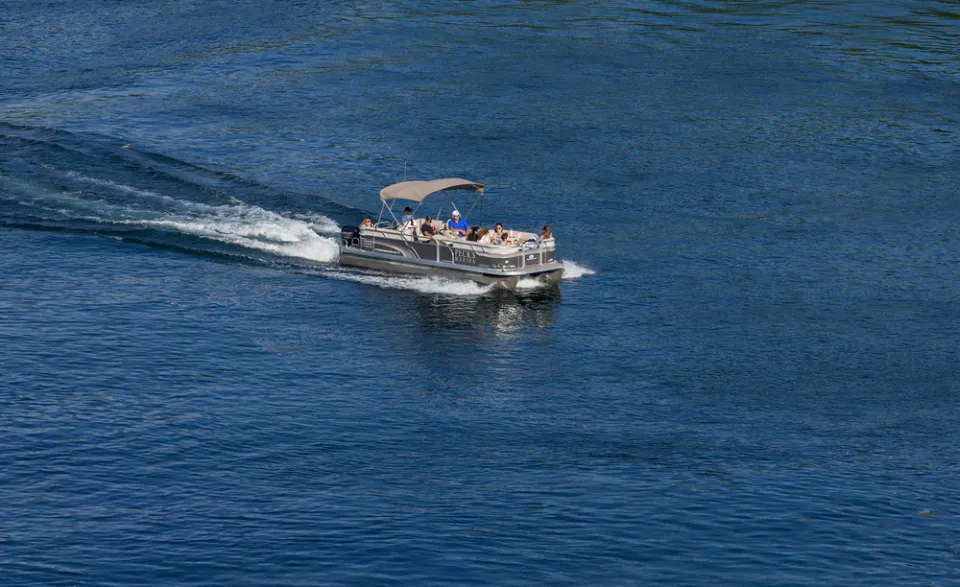
If you are keeping your boat docked in the water then your tubes need to be prepared for it. They will require anti-fouling and anti-corrosion painting, just like other boats.
Electrical Prep
You want to make sure the electrical system on your boat is always in good working order. But if you’re in salt water it’s especially important that you don’t have any wires accidentally touching the tubes or exposed in any way. Galvanization is the result of the combination of saltwater and electricity, and if you’re not careful, it will seriously damage your boat.
Trailer Prep
When you’re considering how to get your pontoon boat ready for the ocean, don’t forget your trailer. Just like your pontoon, if you didn’t get one specifically with the intention of salt water boating, it may not be ready. When exposed to saltwater, you need a galvanized trailer that won’t corrode too quickly. If your trailer isn’t made for saltwater, your boat may easily become corroded.
Don’t forget to spray off your trailer alongside your boat when you get them both out of saltwater.
How to Handle Pontoon Boats Safely in Rough Waters?
When handled properly, pontoon boats are fairly stable. A pontoon, like any other vessel, can capsize when handled improperly in rough water, but when everything goes according to plan, they are usually able to return to port without any serious problems.
With a little common sense and preparation, pontoons can therefore withstand choppy waters just fine. But before you launch your pontoon into the water, you should be familiar with how to control it in case the weather changes quickly.

Here’s what you should keep in mind when encountering big waves:
- Keep an even distribution of weight across the pontoon. The vessel’s capacity to withstand big water can be significantly improved by maintaining a stable distribution of weight on both sides of the centerline. However, the added height of double-decker pontoon boats and other boats with similar modifications can have a negative impact on the center of gravity and make the boat more prone to tipping over.
- When crossing large waves, don’t slow down. The trick to staying afloat in rough waters is to keep the pontoons above the waterline and to avoid dipping their nosecones directly into the waves as this can cause a big wave to crash on top of you. It typically occurs when you slow down as you approach a wave’s trough, and it can be extremely dangerous for both you and your boat’s safety. Instead of slowing down as you approach the waves, think about maintaining your speed or even speeding up a little to help you lift the bow a little higher above the water.
- Try to position your boat so that you are taking the waves at an angle of between 30 and 45 degrees off the centerline rather than cruising directly into them. Your course through the water is made easier by doing this. The way your boat handles is greatly affected by how well you ride the waves. By doing this, you can contribute to making sure that your bow will consistently remain above the water during crests and troughs. Adjust your course to take the waves a little bit more toward the center of the boat if you feel like the corner of the boat is beginning to dip.
Safety Tips for Pontooning in the Ocean
You can have fun and stay safe while boating with the help of some advice.
Avoid Accessories
As was previously mentioned, some accessories are not advised for use with pontoons, especially if they are intended for use in the ocean.
Check for Leaks
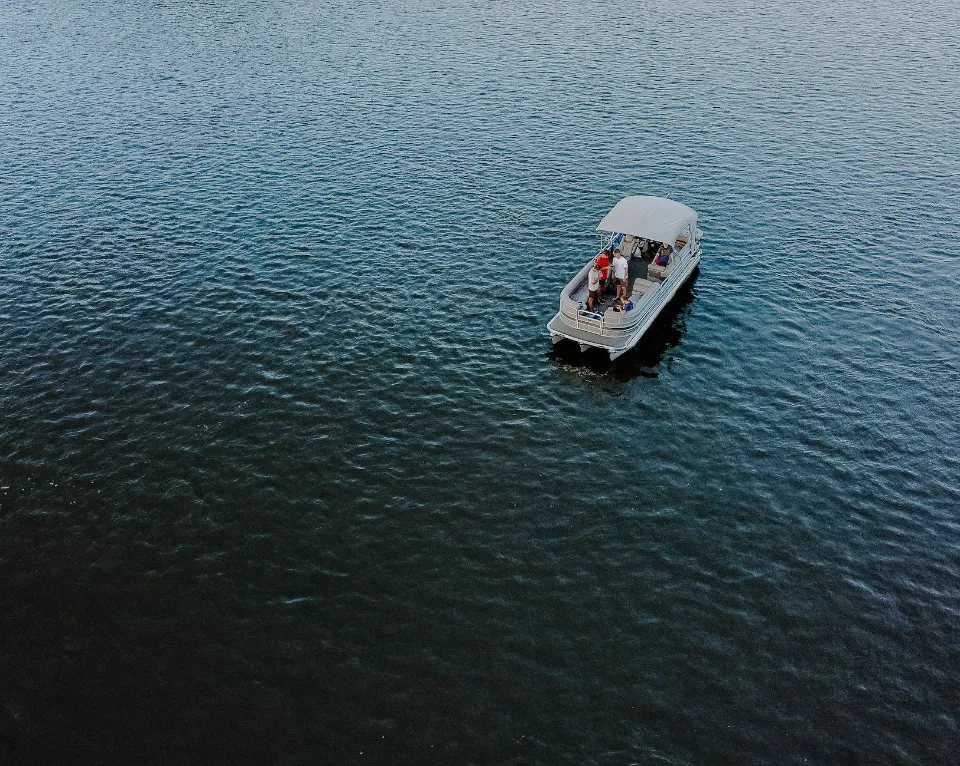
Before setting sail on the ocean, make sure all the valves, drain plugs, pipes, and fittings are in working order. You can determine the condition of the boat by doing this. Going out on the water without checking everything is dangerous because pontoons with leaks can lose their buoyancy.
Research on the Weather
You should always check the weather forecasts, whether or not you are using a pontoon, to prevent getting stranded in the middle of the ocean in inclement weather.
Keep an eye out for any sudden weather changes. Keeping an eye on your surroundings will help you avoid weather-related danger.
Follow Instructions and Guidelines
The manufacturer of the boat you are using should be consulted for safety-related instructions and recommendations. The recommended passenger count and the list of accessories you are permitted to install are both available. If you are renting one, abide by the safety instructions provided by the rental company.
Proper Pontoon Boat Maintenance
When you take your boat into rougher waters, how you clean, maintain, and care for it will also affect how long it lasts overall.
Before you leave the dock or ramp, inspect your boat for any signs of damage or loose fittings if you’re often pounding over the waves. Always thoroughly rinse your boat with fresh water at the end of the day if you are boating in saltwater. To rinse and remove salt and deposits, as well as to reach all the nooks and crannies, especially below deck, use a strong hose blast.
To avoid spending too much time in the salt, it is ideal to hoist or pull a pontoon boat out of the water onto a trailer or lift when not in use. If you must store your boat in saltwater, coat the tubes and lower unit with an anti-fouling/anti-corrosion paint.
Conclusion
You can travel on the ocean in a pontoon boat. Older pontoon boats frequently perform significantly worse in choppy water than newer models. You may be able to reach safety more quickly thanks to their stronger motors.
When the seas are rough, a pontoon boat’s handling is significantly reduced, which can increase the danger. Just make sure you abide by the safety recommendations and advice given.
FAQs
Are Tritoons Seaworthy?
Their length provides more deck space for passengers and all activities you wanna do but does not instantly make them suitable for the ocean. If you’re thinking tritoons are more seaworthy, you’re partially right. More stability and a decreased chance of tipping are provided by three metal tubes.
Are Pontoon Boats Good in Rough Water?
It is better to be bigger. The boat will sit in the water more steadily the heavier it is. That being said, if you plan to boat in rough water, there’s no doubt a bigger pontoon boat will be a good choice. This is something I can vouch for because I own the largest Barletta ever made, which is useful, especially on choppy days.
You can check out more information we have on pontoon boats:

